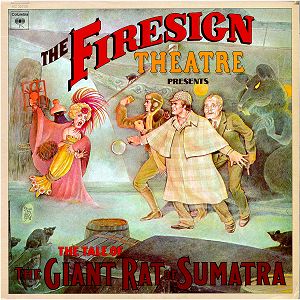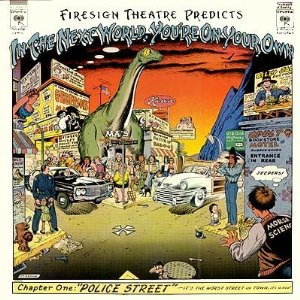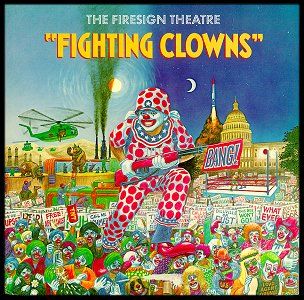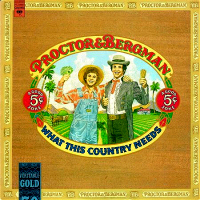This page is based on this
Wikipedia article Text is available under the
CC BY-SA 4.0 license; additional terms may apply.
Images, videos and audio are available under their respective licenses.

Roland Kent LaVoie, better known by his stage name “Lobo”, is an American singer-songwriter who was successful in the early 1970s, scoring several U.S. Top 10 hits including "Me and You and a Dog Named Boo", "I'd Love You to Want Me", and "Don't Expect Me to Be Your Friend". These three songs, along with “Where Were You When I Was Falling In Love”, gave Lobo four chart toppers on the Easy Listening/Hot Adult Contemporary chart.

Everything You Know Is Wrong is the eighth comedy album by the Firesign Theatre. Released in October 1974 on Columbia Records, it satirizes UFO conspiracy theories and New Age paranormal beliefs such as Erich von Däniken's Chariots of the Gods and claimed psychic Uri Geller, which achieved wide public attention by that time.

The Tale of the Giant Rat of Sumatra is the seventh comedy album released by the Firesign Theatre and released in January 1974 by Columbia Records.

The Firesign Theatre's Box of Danger: The Complete Nick Danger Casebook is a four-CD boxed set of most recorded material by comedy group the Firesign Theatre containing their fictional character Nick Danger, portrayed by Phil Austin. Danger is a parody of the hard-boiled detective genre, and is often announced as "Nick Danger, Third Eye", a parody of the term private eye. Danger stories involve stereotypical film noir situations, including mistaken identity, betrayal, and femme fatales. Danger originally appeared on the 1969 album How Can You Be in Two Places at Once When You're Not Anywhere at All, and was reprised in various live shows, radio appearances and albums, including the 1979 Nick Danger: The Case of the Missing Shoe, 1984 The Three Faces of Al, and 2001 The Bride of Firesign.

In the Next World, You're on Your Own was the last comedy album recorded by the Firesign Theatre for Columbia Records. It was released in October 1975.

Not Insane or Anything You Want To is the sixth album released by the Firesign Theatre on Columbia Records. It was released in October 1972 and includes some material that was recorded in the studio as well as some material that was recorded before a live audience.

Papoon for President is a comedy compilation album released in 2002 by the Firesign Theatre. George Papoon is a fictional US Presidential candidate invented by the group in 1972 for their filmed radio broadcast Martian Space Party, in which Papoon is nominated as the candidate of the "Natural Surrealist Party". The album is a compilation of material originally released in the film and the 1972 album Not Insane or Anything You Want To, plus material from 1976 and 1980. The first and last tracks contain interviews of Phillip Proctor and Peter Bergman done by Steve Marshall, broadcast on NPR both before and after the 1972 United States presidential election. These interviews were released on a promotional recording, A Firesign Chat with Papoon, by Columbia Records in November 1972.

Forward Into the Past is a 1976 compilation album by the Firesign Theatre. It presents the "Greatest Hits" from their nine Columbia albums and includes two tracks that were previously released only on a single.

Just Folks. .. A Firesign Chat is a 1977 comedy album by the Firesign Theatre. It was the only record the group made under a new contract with Butterfly Records.

Nick Danger: The Case of the Missing Shoe is an EP by the Firesign Theatre. It was released in 1979 by Rhino Records.

Fighting Clowns is a 1980 album by the Firesign Theatre. It is unique among Firesign Theatre albums because it is primarily made up of songs rather than the group's usual audio theater or sketch comedy pieces. Many of the songs on this album were recorded live in front of an audience while some of the songs and much of the linking material was recorded in the studio. Cover artwork was done by Phil Hartman.

Radio Now Live is a 2001 comedy album by the Firesign Theatre, recorded from a live performance on a 1999 West Coast tour. Its main concept is based on material from Firesign's studio album Give Me Immortality or Give Me Death, but also contains material based on older albums How Can You Be in Two Places at Once When You're Not Anywhere at All; Don't Crush That Dwarf, Hand Me the Pliers; I Think We're All Bozos on This Bus; and Anythynge You Want To.

A Secret History... The Best of The Divine Comedy is a greatest hits compilation album by The Divine Comedy, released in 1999.

What This Country Needs is the second comedy album by the duo Proctor and Bergman of the Firesign Theatre. It was originally released in September 1975 on Columbia Records, and was among the Firesign Theatre's last Columbia albums, along with In the Next World, You're on Your Own and Forward Into The Past. It was recorded from a live performance at The Bottom Line which contained material adapted or re-used from their 1973 studio album TV or Not TV, plus a few new sketches.
Nick Danger is a fictional character created by the comedy group The Firesign Theatre, portrayed by Phil Austin. Danger is a parody of the hard-boiled detective, and is often announced as "Nick Danger, Third Eye", a parody of the term private eye. Danger stories involve stereotypical film noir situations, including mistaken identity, betrayal, and femmes fatales. Danger originally appears on the 1969 album How Can You Be in Two Places at Once When You're Not Anywhere at All, and is reprised in the 1979 Nick Danger: The Case of the Missing Shoe, 1984 The Three Faces of Al, and 2001 The Bride of Firesign.
"He’s based on the [Dashiell] Hammett Sam Spade character, but as I got more into writing him over the years, he’s become much more like [Philip] Marlowe. I love [Raymond] Chandler’s writing.”

Back From the Shadows was the twenty-fifth anniversary reunion tour of the comedy group the Firesign Theatre, performed at twenty cities across the United States in 1993. A live video CD recording of three performances was released as the group's nineteenth album in 1994 by Mobile Fidelity Sound Lab.




















